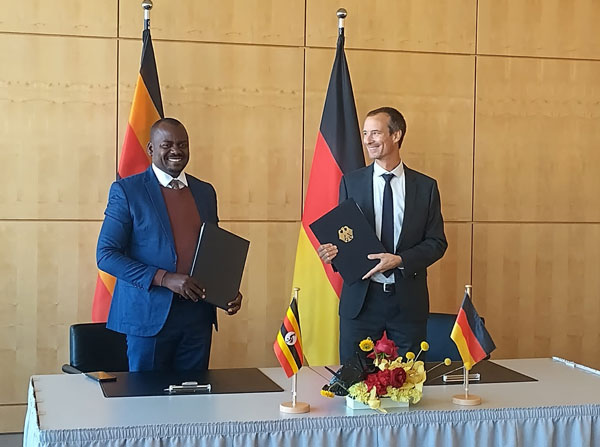
New German commitment will particularly focus on improving climate adaptation and resilience
Berlin, Germany | THE INDEPENDENT | Uganda and Germany have successfully concluded government negotiations on the framework for development cooperation for the next two years. Germany has committed EUR 68.8 million in grants.
The new commitment will particularly focus on improving climate adaptation and resilience, e.g. through support to the sustainable management of forests.
Germany extended and up-scaled the bilateral cooperation with Uganda in the focus areas
- · Transformation of agri-food systems, focusing on rural development and agriculture
- · Peaceful and inclusive societies, focusing on refugees and host communities as well as good governance (accountability, anti-corruption, public finance management) and civil society
- · Climate and Energy, focusing on renewable energy and energy efficiency and climate adaptation and resilience
Ugandan-German cooperation aims at fostering Uganda’s sustainable development by creating jobs for the youth and woman, promoting private sector development, enhancing access to electricity or by strengthening the role of civil society in public processes.
Climate change is one of the defining global challenges of our time. Forests – through their carbon storing function – help mitigate climate change while, particularly true for Uganda, the forest cover has been dramatically decreasing. Therefore, a new focus under the focus area Climate and Energy will be the support to the sustainable management of forests and sustainable forestry. A total of EUR 18 million will go to the protection of forests. In doing so, a particular focus will be on increasing the benefits from forests to local communities and on forest-related value chains.
In addition, EUR 7.5 million will go to the promotion of renewable energy and energy efficiency. The support will include the creation of “green” jobs in the energy sector, e.g. solar technicians.
A further EUR 7.5 million goes to strengthen agriculture and rural development under the area Transformation of agri-food systems. Central to this support will be climate-smart agriculture, the development of sustainable value chains as well as – in the light of Germany’s so-called feminist development policy – the strengthening of woman as key actors for rural development.
EUR 6 million will go to the support to good governance and civil society, which will include the promotion of accountability, human rights and civil society. One working area will be the strengthening of social accountability, where public institutions and civil society organizations work together to ensure accountability in public processes.
To support the implementation of the Common Refugee Response Framework (CRRF), EUR 7.8 million will go to the strengthening of water supply and sanitation infrastructure for refugee settlements and host communities. While this program focuses on strengthening the local service providers, a further EUR 22 million will target the construction of (climate-resilient) infrastructure in the water and sanitation sector in Northern Uganda.
All German programs support Uganda in implementing its National Development Plan III, the Agenda 2030 and the Sustainable Development Goals (SDGs) as well as the Agenda 2063 of the African Union.
The (biannual) negotiations took place in Berlin, Germany, and were the first negotiations after the outbreak of the Covid-19 pandemic to bring together the Ugandan and German delegation in person.
The talks resulted in the signing of a summary record on 12 October 2022 by Haj Kyeyune Haruna Kasolo, State Minister for Finance, Planning and Economic Development (Micro Finance), for the Ugandan side and by the Head of the East Africa Division of the Federal Ministry of Economic Cooperation and Development, Mr. Marcus von Essen, as head of the German Delegation.
 The Independent Uganda: You get the Truth we Pay the Price
The Independent Uganda: You get the Truth we Pay the Price






The face of a smiling Haj Haruna signing $69m MOU with a German diplomat beggars belief given Govt hard stance on EU. I suppose it’s all about show me the colour of the money and you can have a variation of The Democratic Governance Facility (DGF) on the table with levers of human rights inserted to please EU, and presumably project based to give the donor some control, and load the beneficiary with accountability.
It can only be good news for a country in desperate need of $$$$s to balance its budget.